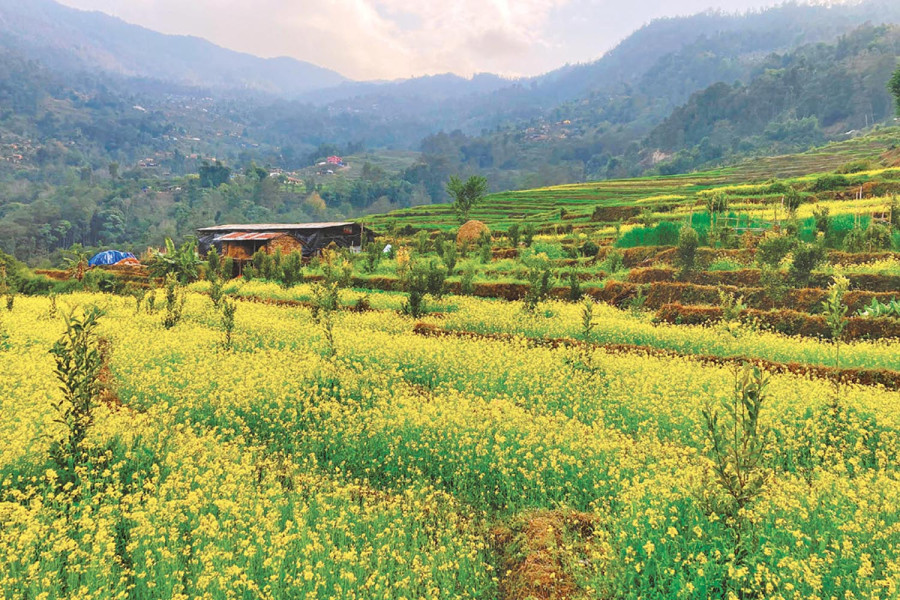National
Farmers high and dry as local units fail to help
Local governments only care about construction of roads and bridges, neglecting agriculture, voters say.
Binod Ghimire
Praseni, a village in Ward 4 of Gadhawa Rural Municipality, Dang, lacks irrigation. Farmers from the village depend largely on rains for farming. There are some deep borewells, but farmers like Labaru Chaudhari don’t have one. If Chaudhari needs to irrigate his field during the dry season, he has to fork out for water as he must pay the borewell owners.
When he voted in 2017 to elect local representatives, he was optimistic that his concerns about lack of irrigation would be addressed. But five years later, his plight remains the same: either wait for rains or pay hundreds of rupees to irrigate his land.
“The return from agriculture is not high. If I have to buy water for irrigation, I am at a loss sometimes which is very discouraging,” he told the Post over the phone from his home village.
The country is holding local elections on May 13. But none of the parties or candidates have come up with plans to address the problems like irrigation faced by farmers such as Chaudhari.
He says the local government failed to attach importance to the needs of the farmers despite the fact that most of the people are engaged in farming.
“On the one hand, there are challenges in production and on the other, we don’t get a good price for our produce,” he said. “It is better to work as a daily wage labourer than plough the fields.”
The Constitution of Nepal gives local governments authority over different sectors including agriculture and irrigation. Management of agriculture and local agricultural market, irrigation, animal husbandry and animal health are among the explicit powers of the local government. However, farmers say local governments are solely focused on construction of the roads and bridges in the name of development.
“They talk only about roads and bridges. Agriculture-related issues never became an agenda in the last five years,” said Sandip Tripathi from Samaya Mai Rural Municipality-4 in Rupandehi. “They are pointing at the roads and bridges constructed in the last five years to seek votes this time as well. I am pretty sure agriculture is not going to be a priority even in the next five years.”
Nepal is an agricultural country with 66 percent people directly engaged in farming. The agriculture sector contributes slightly above 25 percent to the country’s gross domestic product, the second highest after the service sector.
Farmers from different parts of the country say while other infrastructures are important too, local governments must also give due priority to the agriculture sector.
They say that works such as providing improved seeds, arranging irrigation systems through deep borewells and creating markets for their produce could have easily been done if the local representatives indeed wanted so.
“Either our leaders don’t know about the importance of agriculture or they are ignoring farmers’ issues,” said Krishna Yadav from Butahaniya in Maharajgunj Municipality, Kapilvastu. “We face a double whammy: farming itself has become difficult, and when we have the produce, there is neither the market nor the price.”
Nepal’s political parties over the years have been churning out manifestos with big and unrealistic promises, paying little or no attention to local needs. Until 2017 local elections, there were no elected bodies and representatives to cater to the local level needs. But parties and candidates seem to have failed to differentiate between local and general elections, as they are promising big development projects or freebies.
Experts say local governments can play a key role to uplift Nepal’s agriculture sector, which is largely confined to sustenance farming.
Hari Dahal, a former secretary at the Ministry of Agriculture, says most of the local governments don’t have a plan for agriculture development.
“If the local governments want to see the lives of the people change, they must invest in agriculture,” he told the Post. “However, the last five years have largely been squandered when it comes to uplifting the agriculture sector.”
Farmers agree with Dahal.
Hanuman Kahar, a farmer from Yasodhara Rural Municipality in Kapilvastu, said politicians talk about prosperity but they seem to have failed to realise that agriculture can be the foundation.
“Local governments must prioritise commercial farming. It will not only lift our living standards but also decrease the migration for work,” he said, referring to the number of youths flying to the Persian Gulf and other countries for employment.
Despite being an agricultural country, Nepal’s import of agricultural goods is ever increasing. In the last fiscal year 2020-21, there was a 30 percent year-on-year jump to its agricultural goods import bill, taking it to a staggering Rs325 billion, which is one fifth of the country’s total import.
“Development of the agriculture sector can subsequently decrease the country’s import bills, thereby decreasing the trade deficit,” said Dahal. “The local governments must step up to mechanise the agriculture sector.”
According to him, the country is lagging behind in adopting modern technology and innovation in agriculture because there is a perception that it is a traditional profession, which is why the youths are detaching themselves from the sector.
Dahal, however, also sees a lack of coordination between the three tiers of government to solve the existing problems in the agriculture sector. He says while the federal and provincial governments must increase their support, the local governments must be willing to take the lead.
Farmers say as the candidates are reaching out to them, they have started demanding that the aspirants focus on making agriculture their election agenda.
“Let’s hope our leaders have understood the importance of agriculture and the plight of the farmers,” said Mewalal Agrahari from Ramgram Municipality in Nawalparasi. “The elected representatives must prioritise farming.”
(With inputs from district correspondents.)




 10.12°C Kathmandu
10.12°C Kathmandu















